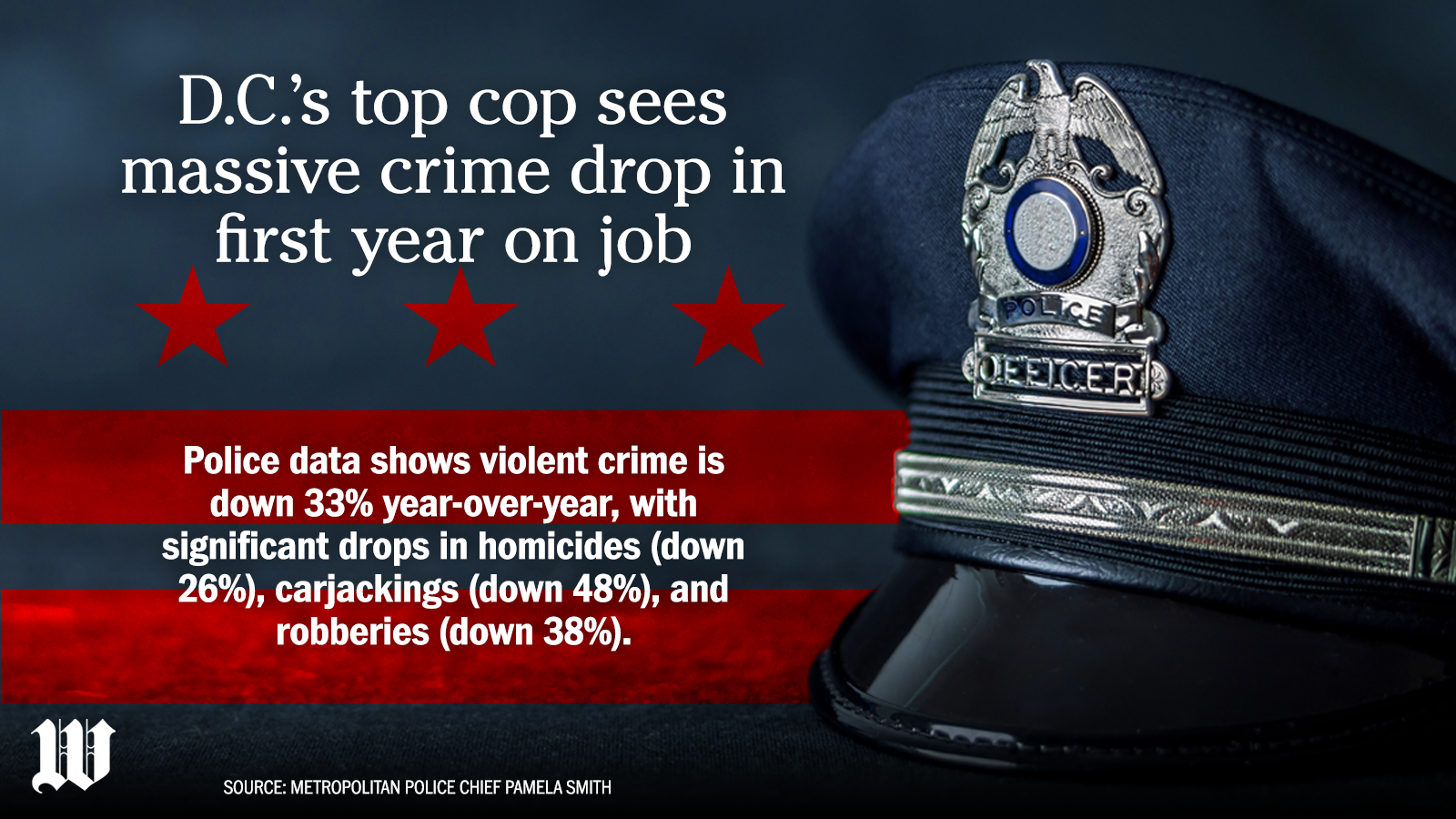Metropolitan Police Chief Pamela Smith ended her first year as the District’s top cop Wednesday by overseeing a major decline in the deadly shootings and rampant carjackings that were terrorizing the city when she took over.
Chief Smith told The Washington Times it was “concerning” to be named the department’s leader at a time the District was witnessing bloodshed that rivaled the drug-fueled killings of the 1990s.
She also said in her interview that she experienced a learning curve with protecting a large city that houses the nation’s political class, as congressional members victimized by violent car thefts and assaults brought further scrutiny on the District’s crime woes.
But the veteran federal police officer said she knew crunching the right numbers and building connections with residents would pay off in the long-term.
Chief Smith added that paying attention to high-crime areas during the colder, less-active months was key to preventing those summer spikes in violence that can upend the best peacekeeping efforts.
“Instead of waiting to launch our summer crime initiative during the summertime, I started working on it in December and we launched it in January,” Chief Smith said. “I was able to get resources allocated to those areas before we get to our peak season.”
The results speak for themselves: police data shows violent crime is down 33% year-over-year, with significant drops in homicides (down 26%), carjackings (down 48%), and robberies (down 38%).
The chief said deploying summer public-safety resources in the winter months helped drive down violence in such high-crime neighborhoods as Washington Highlands, Rosedale and Anacostia.
Further, she said she focused patrols on crime-heavy areas after looking at the day and time when certain offenses more often occurred.
When the police needed to make arrests, she said relationships with locals built during regular safety walks convinced them to come forward as witnesses.

“We’re getting so much buy-in from the community because we are present,” Chief Smith said. “You can’t have a relationship with somebody unless you’re around them, or you’re present in that space.”
It’s evident that Chief Smith isn’t new to law enforcement — she finished her lengthy career with the U.S. Park Police in 2022 as the federal department’s first Black female chief. But new responsibilities invited new challenges.
One of those was navigating congressional oversight into the District’s laws and policies.
Federal lawmakers blamed the District’s soft-on-crime laws for facilitating last year’s surge in violence. Republicans led the charge, though it was a bipartisan coalition that shot down a rewrite to the D.C. criminal code as too offender-friendly.
Most congressional hearings on D.C. crime took place before Chief Smith became top cop. Still, the chief said her main take-away from that episode was knowing to be upfront with people when there is a spike in crime, as well as when there’s a reduction.
One unexpected development the chief said came out of the 2023 crime wave was residents’ renewed support for MPD.
During the 2020 anti-police brutality riots sparked by George Floyd’s death, the District became a hotbed for activism.
The movement led to local legislation from the D.C. Council that curtailed police protocols and dampened morale in the department.
Chief Smith said MPD didn’t hire any new officers for about 18 months.
Fast forward to the present, and two big signs cited by Chief Smith as showing that people want more police presence.
She noted the lack of community backlash against the MPD flying drones in the streets and the number of residents who have consented to let the department tap into their doorbell and home-surveillance cameras.
“When you think about cameras, I mean, that was unheard of right?” the chief said. “Nobody wanted that eye in the sky watching everything, and certainly not from law enforcement.”
The chief still recognizes there is work to do.
While she’s proud of the Real-Time Crime Center — MPD’s massive, camera-laden surveillance hub — she said she’s frustrated by the crimes committed by juveniles and the unwillingness of many parents to hold their children accountable themselves.
She also recognizes that bringing crime down from last year’s high is just the first step. Getting crime down to the levels before the COVID-19 lockdowns is the goal.
• Matt Delaney can be reached at mdelaney@washingtontimes.com.




Please read our comment policy before commenting.